
Aug 12
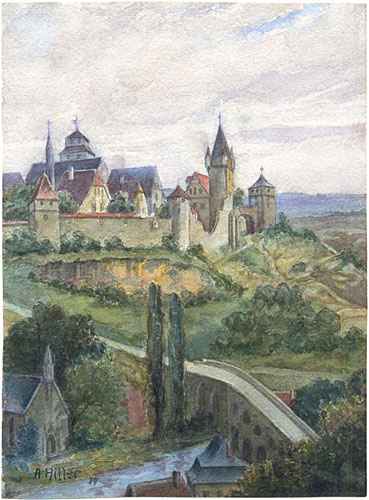
1860 Birth: Klara Poelzl—later to be Adolf Hitler's mother—is born of a union between Hitler's maternal grandmother, Johanna Huettler, and the farmer Johann Poelzl, in the small village of Spital, just thirty miles north of the reputedly blue Danube. [For further details, Click here.]

1898 Spanish-American War: A Protocol of Peace between the United States and Spain is signed in Washington. The United States formally annexes the Hawaiian Islands.
From Living America by Norman C. Lumian:The future of American interests seemed to have become quite uncertain with the ascension of Queen Liliuokalani to the islands' throne. The queen objected to the lease which gave the Yankees control of Pearl Harbor; she also resented their rule of the islands' economy. Within two years after the rise of the somewhat dictatorial "Queen Lil," the few Americans of the islands had had enough of her ways. Led by American Minister John L. Stevens, who was backed by the Secretary of State, they helped start a revolt. Stevens then sought protection for his people and ordered the landing of Marines, who were stationed on a cruiser in Pearl Harbor. Liliuokalani's government soon fell.
Under the leadership of Sanford Dole, the "pineapple king," a new government—operated by the small American minority—was formed. Hawaii then requested, almost immediately, annexation by the United States. Incoming President Grover Cleveland was so enraged by these ruthless tactics that he withdrew the annexation treaty from the Senate. The President was only one of a large number of American anti-imperialists of the time. Cleveland recognized the independence of the island republic in the next year, 1894, and it remained independent until 1898. In that year, pointing to Hawaii's value as a naval base in the Spanish-American War, President McKinley requested, and Congress approved, Hawaii's annexation.
1914 World War I: Various:
Britain—automatically including British Empire countries—declares war on Austria-Hungary.
Serbia invaded by Austria:
Austrian troops numbering 200,000 commanded by General Oskar Potiorek, cross the Sava and Drina Rivers and invade Serbia.
Although Oskar Potiorek (1853-1933) served as a military commander in the Austro-Hungarian army, and was responsible for the first (unsuccessful) invasion of Serbia in 1914, he is chiefly remembered today as the man responsible for the safety of Archduke Franz Ferdinand, the day the latter was assassinated in Sarajevo on 28 June 1914.
Parliament passes the Defense of the Realm Act:
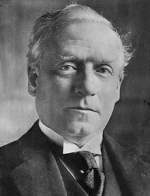
After Britain declared war on Germany, Asquith [the Prime Minister] urged Parliament to pass legislation bulking up the government's power in wartime; Parliament obliged on August 12 with the Defense of the Realm Act (DORA). The terms of the act enabled the British government to seize resources, including property, buildings, or land for the war effort. The act also applied guidelines for wartime censorship and control of the country's labor force.
If the DORA marked Britain's attempt to regulate life on the home front during wartime, even more measures were enacted to stimulate the country's military preparedness. Of all the great powers at the start of World War I, Britain was the only one without a policy of conscription; as a result, their army was small and highly trained but numerically inferior to those of continental Europe. Beginning on August 7, Britain's newly appointed war minister, Lord Horatio Herbert Kitchener, sent out a public call for 100,000 volunteers to join the British army. Though the turnout was undeniably impressive--almost 500,000 men enlisted in the first six weeks of the war alone--some doubted the quality of these so-called "Kitchener armies," especially compared to those of Germany, who with the help of conscription, had been steadily building and improving its armed forces for the past 40 years. In January 1916, with World War I entering its third calendar year, Parliament passed the Military Service Act, Britain's first-ever conscription bill. By the war's end the country had enlisted 49 percent of its men between the ages of 15 and 49 for military service. (History.com)
1915 World War I: Various:
Shipment of US Munitions to Britain: US Reply to Austro-Hungarian Protest:
The Government of the United States notes with satisfaction the recognition by the Imperial and Royal Government of the undoubted fact that its attitude with regard to the exportation of arms and ammunition from the United States is prompted by its intention to "maintain the strictest neutrality and conform to the letter with the provisions of international treaties," but is surprised to find the Imperial and Royal Government implying that the observance of the strict principles of the law under the conditions which have developed in the present war is insufficient, and asserting that this Government should go beyond the long recognized rules governing such traffic by neutrals and adopt measures to "maintain an attitude of strict parity with respect to both belligerent parties." To this assertion of an obligation to change or modify the rules of international usage on account of special conditions the Government of the United States cannot accede. The recognition of an obligation of this sort, unknown to the international practice of the past, would impose upon every neutral nation a duty to sit in judgment on the progress of a war and to restrict its commercial intercourse with a belligerent whose naval successes prevented the neutral from trade with the enemy.

List Regiment: Gefreiter Adolf Hitler's 16 Reserve Infantry Regiment continue to occupy a position at Fromelles—pictured above in a drawing by Hitler—on a level field with water channels, willow trees and willow stalks; in the distance towards the enemy lines lies an insignificant wood with barbed wire entanglements. Under the direction of their defense-minded commander, Lieutenant General Gustav Scanzoni von Lichtenfels, the regiment works ceaselessly day and night to further fortify their position at Fromelles while fighting off repeated assaults by the enemy. [For further details, Click here.]
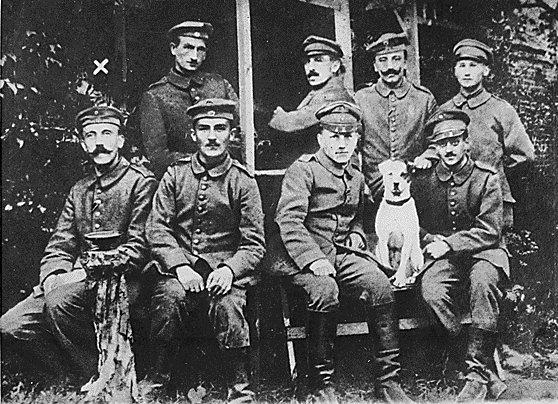
1916 World War I: List Regiment: Gefreiter Adolf Hitler endures trench warfare in Flanders (Artois) with 3 Company, 16 Reserve Infantry Regiment. [For further details, Click here.]
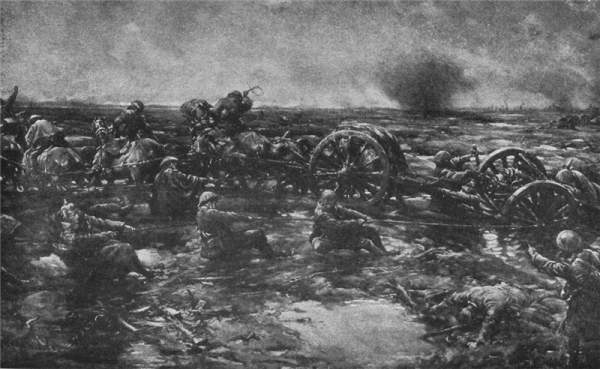
1917 World War I: List Regiment (July 22-September 8): Dispatch Runner Gefreiter Adolf Hitler serves at the front with 3 Company, 16 Bavarian Reserve Infantry Regiment during Phase 2 operations in Flanders. Most of their time in the trenches gas masks are worn, while English bombers attack, and tanks—a new terror witnessed for the very first time by most—attempt to advance over a long front through seas of mud. [For further details, Click here.]
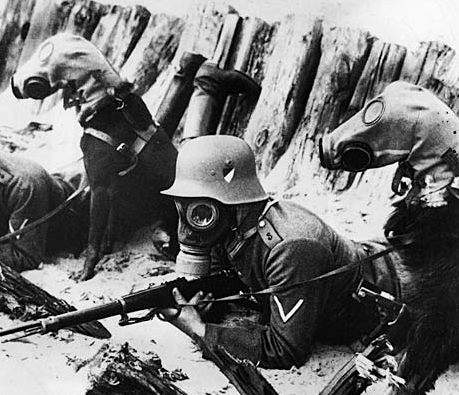
1918 World War I: Various:
List Regiment (July 20-August 4): Gefreiter Adolf Hitler's 16th RIR is tasked with building a new line of defenses on the site of the failed Second Battle of the Marne. [For further details, Click here.]
Ludendorff, after having informed the Kaiser on August 10 that "we have suffered a great defeat [at Amiens] . . . the war must be ended" puts a happy face on the situation for the consumption of the troops:On the battlefront, the enemy launched a violent attack to the north of the Somme and between the Somme and Lihons in the early morning hours . . . . On both sides of the Amiens . . . we turned back enemy attacks. Between the Avre and the Oize strong attacks by the enemy lasted until nightfall. They were completely defeated. The French suffered especially heavy losses near Tilloloy.
1919 Henry Cabot Lodge on the League of Nations:
The independence of the United States is not only more precious to ourselves but to the world than any single possession. Look at the United States today. We have made mistakes in the past. We have had shortcomings. We shall make mistakes in the future and fall short of our own best hopes. But none the less is there any country today on the face of the earth which can compare with this in ordered liberty, in peace, and in the largest freedom? I feel that I can say this without being accused of undue boastfulness, for it is the simple fact, and in making this treaty and taking on these obligations all that we do is in a spirit of unselfishness and in a desire for the
1938 Nazi Germany: Hitler institutes the Mother's Cross to encourage German women to have more children, to be awarded each year on August 12, Hitler's mother's birthday:
The German Reich needed a robust and growing population and encouraged couples to have large families. It started such encouragement early. Once members of the distaff wing of the Hitler Youth movement, the League of German Girls, turned 18, they became eligible for a branch called Faith and Beauty, which trained these girls in the art of becoming ideal mothers. One component of that ideal was fecundity. And so each year, in honor of his beloved mother, Klara, and in memory of her birthday, a gold medal was awarded to women with seven children, a silver to women with six, and a bronze to women with five. (History.com)
1939 Countdown to War: Various:
The British-French military mission begins talks in Moscow: They will continue until August 19, but no agreement will be reached because of a dispute over Soviet troops being allowed in Poland. (THP)
Ciano meets with Hitler at Berchtesgaden:

Hitler is pondering over his maps, planning the war against Poland. Hitler believes that the war will be localized and there is not the slightest danger that Britain and France will fight. When Ciano protests that so little would be gained at such vast risk, Hitler says to him "You are a southerner, and you will never understand how much I, as a German, need to get my hands on the timber of the Polish forests." Ciano notes: "He has decided to strike, and strike he will."
1940 World War II: War in the air:
The Luftwaffe launches a large-scale bombing attack on six British radar facilities. Radar has become important to the British because it enables them to spot incoming bombers at great distances and alert the fighter squadrons to meet them. In this first surprise raid, five radar facilities are damaged and one destroyed.
The Germans made a concerted attack on radar stations in Kent, Sussex and the Isle of Wight on 12 August and a few, uncoordinated raids thereafter. Only Ventnor was put out of action for any significant period. Apart from the difficulty in destroying the open, lattice work structures of the transmitting and receiving masts, the Germans never fully understood the crucial role of radar to the British and, therefore, did not place the highest of priorities on its destruction.
1941 World War II: Various:
Roosevelt and Churchill confer, map out short- and long-term goals
President Franklin D. Roosevelt and Prime Minister Winston Churchill meet on board a ship at Placentia Bay, Newfoundland, to confer on issues ranging from support for Russia to threatening Japan to postwar peace.
When Roosevelt and Churchill met for the first time as leaders of their respective nations, chief among the items on their agenda was aid to the USSR "on a gigantic scale," as it was desperate in its war against its German invaders. A statement was also drafted, which Roosevelt chose to issue under his name, that made it plain to Japan that any further aggression would "produce a situation in which the United States government would be compelled to take counter-measures," even if it meant "war between the United States and Japan."
The president and the prime minister also agreed to compose and make public a document in which the United States and Britain declared their intention "to ensure life, liberty, independence, and religious freedom, and to preserve the rights of man and justice." They also promised to strive for a postwar world free of "aggrandizement, territorial or other," addressing those nations currently under German, Italian, or Japanese rule, offering hope that the integrity of their sovereign borders would be restored to them. This document would be called the Atlantic Charter and, when finally ratified by 26 nations in January 1942, would comprise the founding principles of the United Nations. (History.com)
Vichy: Pétain announces full French collaboration with Nazi Germany.
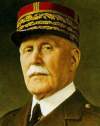
Later, in his defense, Pétain made the claim that he was playing a cunning "double game, hoping to shield France from destruction until Germany's defeat. In fact, Pétain persistently sought to trade his government's cooperation with Germany for a non-punitive peace, the maintenance of the French empire, and an important role for a regenerated France in the new order that he believed would be established after Germany's victory over Britain. France, he hoped, would serve as a "west wall and help defend Europe against Bolshevism. Pétain also dreamed of an internal "national revolution to transform France into a stable authoritarian order based on "work, family, fatherland.
Hitler, however, spurned French offers and promised nothing because he knew that Pétain was powerless to resist his increasingly harsh demands for money, materiel, workers, and, finally, Jews for slaughter.
Barbarossa: German drive to Staraja Russa, south of Lake Ilmen, 90 miles from vital Leningrad-Moscow railway line.
War at sea: The US Navy takes over patroling convoy routes in the North Atlantic and tracking German submarines for the Royal Navy in violation of Neutrality Act.
1942 World War II: Various:
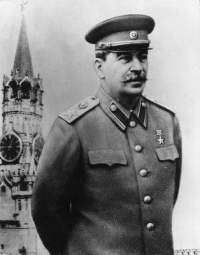
Stalin to FDR: "Your message of August 9 to hand. The Soviet Government takes a favorable view of Mr. Wendell Willkie's visit to the USSR and I can assure you that he will be most cordially entertained."
Barbarossa: German forces capture Elista, near the Caspian Sea, in their advance south toward the Grozny oilfields.
1943 World War II: Barbarossa: Hitler orders the construction of a fortified defense line (Panther-Stellung) along the Dnepr river.
1944 World War II: Various:
Churchill to Marshal Tito:
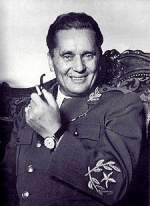
The desire of His Majesty's Government is to see a united Yugoslav Government, in which all Yugoslavs resisting the enemy are represented, and a reconciliation between the Serbian people and the National Liberation Movement . . . . If it should turn out that any large quantities of ammunition sent by His Majesty's Government are used for fratricidal strife other than self-defense, it would affect the whole question of Allied supplies, because we do not wish to be involved in Yugoslav political differences . . . . His Majesty's Government, while regarding Marshal Tito and his brave men with the utmost admiration, are not satisfied that that sufficient recognition has been given to the power and rights of the Serbian people, or to the help which has been given, and will be continued, by His Majesty's Government."
Death: Joseph P. Kennedy, Jr.: eldest son of former US Ambassador Joseph P. Kennedy, when his PB4Y1 bomber, the Zootsuit Black, literally a flying bomb, loaded with 21,170 pounds of dynamite, explodes over the English Channel during a secret mission against German V2 sites.
Decommissioned war weary bombers were loaded with a highly volatile explosive, Torpex, and then guided to their target via radio control from a 'mother' aircraft following behind. The final dangerous ingredient of the project was that the drone aircraft ('the babies'), needed to be initially piloted by a two man crew until control could be established by the 'mother' aircraft. The volunteers for this role were a special breed -- fuelled by a kamikaze like credo or the death-drive.
The first PLUTO (Pipe Line Under the Ocean) supplying fuel across the English Channel to the Allied forces in France, goes into operation from the Isle of Wight. It can transfer up to 700 tons of fuel a day.
Yugoslavia: Major German operation commences against Tito's partisan army
The Warsaw Uprising: Churchill responds to desperate appeals from Warsaw by sending 28 bombers with supplies from Italy. Stalin refuses use of Soviet airfields nearby.
Churchill to Stalin:

(I have received a) distressing message from the Poles in Warsaw, who after ten days are still fighting against considerable German forces who have cut the city in three . . . . They implore machine guns and ammunition. Can you not give them some further help, as the distance from Italy is so great?"
1945 World War II: Various:
Japanese leaders choose not to accept the Allied demand of unconditional surrender.
Nuremberg War Crimes Trials: Major war criminals who had been housed in Luxembourg are flown to Nuremberg, where they are incarcerated in a prison adjacent to the Palace of Justice. (Maser II)
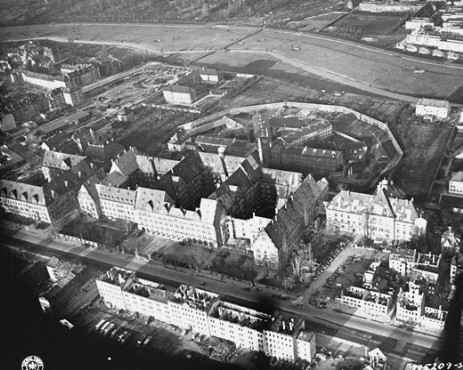
1946 Nuremberg Tribunal:
On the 201st day of the trial, Major General Alexandrov, the Assistant Prosecutor for the USSR, continues the intense cross-examination of German Field Marshal Erich von Manstein:
General Alexandrov: Please, Witness, look at Section 3 of the decree, Point c. I shall read it into the record: "For this task ruthless conscription of the civilian population uninfluenced by any false leniency, the speedy commencement of work, and the establishment of construction battalions, including female construction battalions, must be secured." Do you consider this method of utilizing the civilian population, including the female population, as a method necessitated by military considerations?
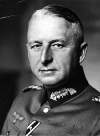
Von Manstein: As I see it, I do not doubt at all that it was necessary from a military standpoint; whether or not it was nice from a humane point of view, is another question. But I must point out that the use of the civilian population, including the women, was something we learned from the Soviet Union, which did just that to a large extent; otherwise the provision of Russian anti-tank ditches many kilometers long would not have been possible in a few days.
The President: Witness, is it your contention that it is in accordance with the laws of war to turn the females of a country into a construction battalion for the purpose of your army?
Von Manstein: I am not absolutely certain at the moment whether that is in accordance with the laws of war of 1939. That in this war international law was widely trespassed against in many cases is an established fact. That the use of labor, including female labor, is one of the rights of an occupying power, is, I should think, a fact.
General Alexandrov: You have just stated that the Red Army widely used the civilian population for constructing anti-tank ditches, et cetera. I want to explain that to you. That was really so, because the whole Soviet people, including of course, the Soviet women, participated in all possible actions against the Fascist invaders; but give me an illustration, just one illustration, of the Red Army utilizing German women for purposes of this kind.
Von Manstein: I cannot give you an instance from the war.
General Alexandrov: Because there were none; but this decree of Hitler talks of utilizing Soviet women for erecting defense constructions for German forces. That is what I am speaking about.
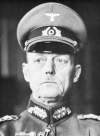
Field Marshal Gert von Rundstedt testifies for the Defense:
Dr. Hans Laternser (Counsel for the German General Staff and High Command of the Armed Forces): When did you consider the war lost?
Field Marshal von Rundstedt: In my opinion the war could not be won after the fall of Stalingrad. I considered the war lost when the Allies had succeeded in establishing a strong bridgehead on French soil. That meant the end.
Dr. Hans Laternser: Did you or other commanders-in-chief attempt to stop the continuation of the war when you regarded it as lost?
Field Marshal von Rundstedt: Both Field Marshal Rommel and I twice attempted to persuade Hitler to change the conduct of the war and especially to withdraw the front to the German borders. But as was to be expected, these suggestions were not heeded.
Dr. Hans Laternser: Since Hitler refused to listen to such advice, did you not consider causing a violent overthrow?
Field Marshal von Rundstedt: I would never have thought of such a thing; that would have been base, barefaced treachery, and could not have changed the situation. The Army and the people still believed in Hitler at that time, and such an overthrow would have been quite unsuccessful. Even if I, perhaps with the aid of the Allies, had brought about an overthrow, the fate of the German people, according to the famous statement of the Big Three, would have been exactly what it is now, and I would have emerged and been considered for all time as the greatest traitor, to my fatherland.
1952 Night of Murdered Poets: Prominent Jewish intellectuals are murdered in Moscow.
1953 Cold War: Soviets test "Layer-Cake" bomb:
Less than one year after the United States tested its first hydrogen bomb, the Soviets detonate a 400-kiloton device in Kazakhstan. The explosive power was 30 times that of the U.S. atomic bomb dropped on Hiroshima, and the mushroom cloud produced by it stretched five miles into the sky. Known as the "Layer Cake," the bomb was fueled by layers of uranium and lithium deuteride, a hydrogen isotope. The Soviet bomb was smaller and more portable than the American hydrogen bomb, so its development once again upped the ante in the dangerous nuclear arms race between the Cold War superpowers.(History.com)
1955 Death: Thomas Mann:

German novelist, social critic, philanthropist, essayist, and Nobel Prize laureate, lauded principally for a series of highly symbolic and often ironic epic novels and mid-length stories, noted for their insight into the psychology of the artist and intellectual. He is noted for his analysis and critique of the European and German soul in the beginning of the 20th century, using modernized German and Biblical stories, as well as the ideas of Goethe, Nietzsche, and Schopenhauer. Mann emigrated from Nazi Germany to Kusnacht near Zuerich, Switzerland, in 1933, then to the United States in 1939, where he taught at Princeton University, along with such other emigres as Albert Einstein.
1961 Cold War: East Germany begins construction of the Berlin Wall:
In an effort to stem the tide of refugees attempting to leave East Berlin, the communist government of East Germany begins building the Berlin Wall to divide East and West Berlin. Construction of the wall caused a short-term crisis in U.S.-Soviet bloc relations, and the wall itself came to symbolize the Cold War.
Throughout the 1950s and into the early 1960s, thousands of people from East Berlin crossed over into West Berlin to reunite with families and escape communist repression. In an effort to stop that outflow, the government of East Germany, on the night of August 12, 1961, began to seal off all points of entrance into West Berlin from East Berlin by stringing barbed wire and posting sentries. In the days and weeks to come, construction of a concrete block wall began, complete with sentry towers and minefields around it. The Berlin Wall succeeded in completely sealing off the two sections of Berlin. The U.S. government responded angrily. Commanders of U.S. troops in West Berlin even began to make plans to bulldoze the wall, but gave up on the idea when the Soviets moved armored units into position to protect it. The West German government was furious with America's lack of action, but President John F. Kennedy believed that "A wall is a hell of a lot better than a war." In an attempt to reassure the West Germans that the United States was not abandoning them, Kennedy traveled to the Berlin Wall in June 1963, and famously declared, "Ich bin ein Berliner!" ("I am a Berliner!"). Since the word "Berliner" was commonly referred to as a jelly doughnut throughout most of Germany, Kennedy's improper use of German grammar was also translated as "I am a jelly doughnut." However, due to the context of his speech, Kennedy's intended meaning that he stood together with West Berlin in its rivalry with communist East Berlin and the German Democratic Republic was understood by the German people.
In the years to come, the Berlin Wall became a physical symbol of the Cold War. The stark division between communist East Berlin and democratic West Berlin served as the subject for numerous editorials and speeches in the United States, while the Soviet bloc characterized the wall as a necessary protection against the degrading and immoral influences of decadent Western culture and capitalism. During the lifetime of the wall, nearly 80 people were killed trying to escape from East to West Berlin. In late 1989, with communist governments falling throughout Eastern Europe, the Berlin Wall was finally opened and then demolished. For many observers, this action was the signal that the Cold War was finally coming to an end. (History.com)
1979 Death: Ernst Boris Chain: German-born British biochemist, and a 1945 co-recipient of the Nobel Prize for Physiology or Medicine for his work on penicillin. After the Nazis came to power, Chain knew that he, being a Jew, would no longer be safe in Germany. He left Germany in 1933 and moved to England. Towards the end of World War II, Chain learned his mother and sister had perished in the Holocaust.
1998 Holocaust: The two largest Swiss banks agree to pay $1.25 billion as restitution to World War II Holocaust victims. (THP)
Edited by Levi Bookin (Copy editor)
levi.bookin@gmail.com



Click to join 3rdReichStudies



Disclaimer: This site includes diverse and controversial materials--such as excerpts from the writings of racists and anti-Semites--so that its readers can learn the nature and extent of hate and anti-Semitic discourse. It is our sincere belief that only the informed citizen can prevail over the ignorance of Racialist "thought." Far from approving these writings, this site condemns racism in all of its forms and manifestations.
Fair Use Notice: This site may contain copyrighted material the use of which has not always been specifically authorized by the copyright owner. We are making such material available in our efforts to advance understanding of historical, political, human rights, economic, democracy, scientific, environmental, and social justice issues, etc. We believe this constitutes a "fair use" of any such copyrighted material as provided for in section 107 of the US Copyright Law. In accordance with Title 17 U.S.C. Section 107, the material on this site is distributed without profit to those who have expressed a prior interest in receiving the included information for research and educational purposes. If you wish to use copyrighted material from this site for purposes of your own that go beyond 'fair use', you must obtain permission from the copyright owner.
Please Note: The list-owner and moderators of 3rdReichStudies are not responsible for, and do not necessarily approve of, the random ads placed on our pages by our web server. They are, unfortunately, the price one pays for a 'free' website.